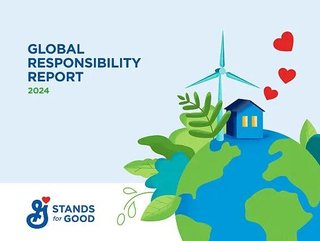How General Mills Will use its Value Chain to cut Emissions

General Mills, the multinational food company, has released its 2024 Global Responsibility Report, detailing progress the company made across three priority areas – Planet, People and Food – during its 2023 fiscal year.
Under the 'Standing for Planet' initiative, General Mills is focused on combating climate change by reducing greenhouse gas emissions across its value chain. The company has exceeded its goals in emissions reduction and is actively engaging in regenerative agriculture and committing to no deforestation in its supply chains. Additionally, General Mills is sourcing renewable electricity and prioritising recyclable and reusable packaging.
“General Mills has a nearly 160-year legacy of standing for good and we’re proud of the impact we’ve had and committed to continuing that journey,” said Jeff Harmening, chairman and CEO, General Mills.

“When it comes to the products we make, it’s never just a box – it’s a promise that care has been taken in all aspects of making it. That promise extends beyond nutrition and great taste to our efforts to improve farmland soil health, be a responsible employer and contribute meaningfully to our communities.”
How General Mills is fighting for the planet
As a global food company, General Mills recognises the risks that climate change presents to people, planet and its business. To drive collective action and continued progress toward the company’s commitment to reduce greenhouse gas (GHG) emissions across its value chain by 30% by 2030 and achieve net zero emissions by 2050.
General Mills released its first Climate Transition Action Plan, which outlines the roadmap to net zero by detailing the company’s integrated approach and evolved decarbonisation strategies across four key climate levers – agriculture and ingredients, energy and manufacturing, transportation and packaging.
Actions to 2030
- One million acres enrolled in regenerative agriculture programmes
- No deforestation in its palm, cocoa and fibre supply chains by 2025
- 100% of its packaging recyclable or reusable by 2030
- 100% sourced renewable electricity across its facilities by 2030
- Increase renewable fuels and electrification in transportation
- Advance whole-farm dairy principles across supply sheds
- Advance supplier engagement on GHG reductions.
Actions to 2050
- Scale regenerative agriculture
- Switch to renewable sources within its facilities and scale in supplier partners
- Circular business models for packaging
- Scale electrification and renewable fuels in transportation
- Scale whole-farm dairy principles across supply sheds.
General Mills surpassed its 2030 Scope 1 and Scope 2 SBTi goals in 2022 and is driving further reductions across its owned operations. Nearly half of the company’s GHG emissions occur upstream of its direct operations, in agriculture, ingredients and packaging. Through 2023, General Mills reduced total value chain emissions by 7% and further reduced Scope 1 and 2 emissions by 12% compared to last year and 51% compared to its 2020 baseline.
“The health of our planet and our ability to make food the world loves are inherently intertwined,” said Mary Jane Melendez, Chief Sustainability and Global Impact Officer, General Mills.

“Our Climate Transition Action Plan and continued progress demonstrate how we are working from the ground up, with partners across our value chain and industry, to help solve today’s food and agriculture challenges and build a resilient future.”
How General Mills is helping the planet right now
- Advancing regenerative agriculture: More than 500,000 acres engaged in General Mills’ regenerative agriculture programmes – more than halfway to the company’s 2030 commitment
- Committing to no deforestation: General Mills is committing to no deforestation in the supply chains of the palm, cocoa and fibre it sources by 2025. This new goal builds on work the company has done since 2014 and supports land use change emissions reductions and forest protection
- Sourcing renewable electricity: Achieved 97% of the company’s target to source 100% renewable electricity for its global operations by 2030
- Designing recyclable and reusable packaging: Ninety-three percent of General Mills’ packaging was recyclable or reusable.
******
Make sure you check out the latest edition of Procurement Magazine and also sign up to our global conference series - Procurement & Supply Chain 2024
******
Procurement Magazine is a BizClik brand
- How Philips is Making Healthcare Supply Chains SustainableProcurement Strategy
- How Kraft Heinz is Unlocking Sustainability SolutionsSustainable Sourcing
- How Coupa's AI Will Help Supply Chains Overcome DisruptionsTechnology & AI
- ePLDT’s CPO is born to the role of procurementProcurement Strategy






